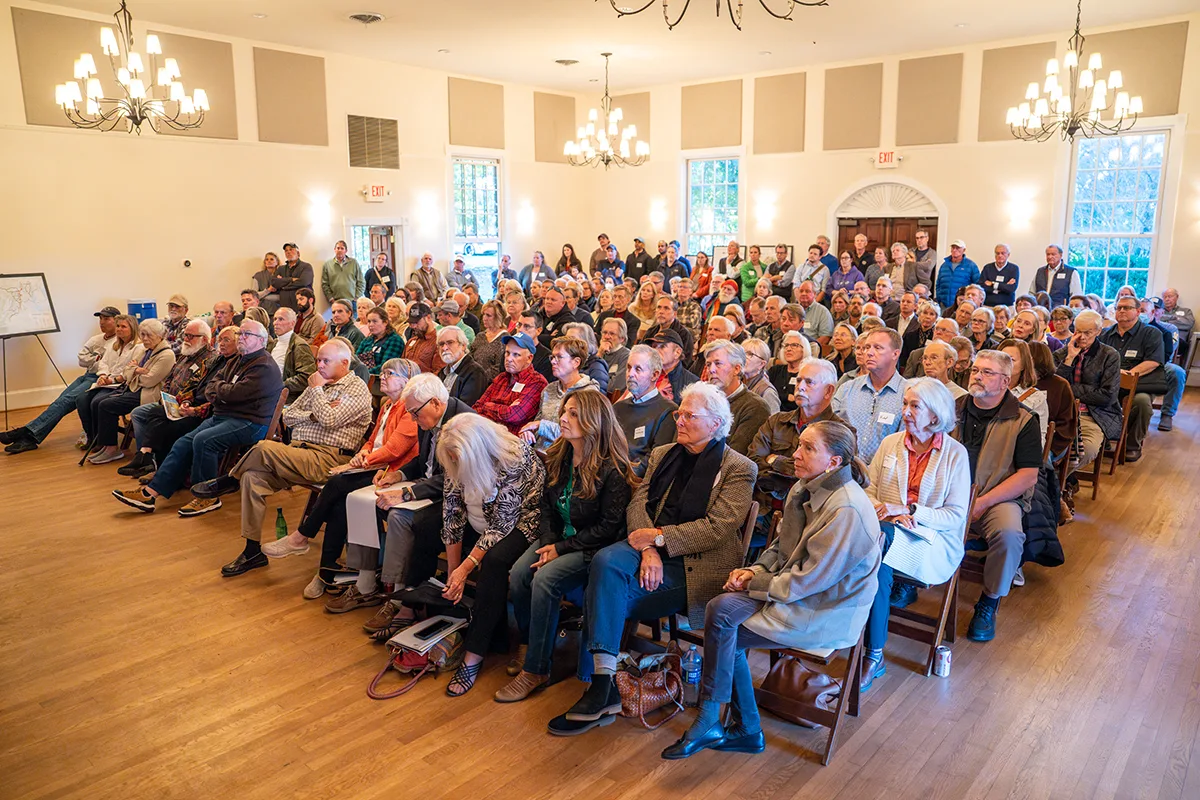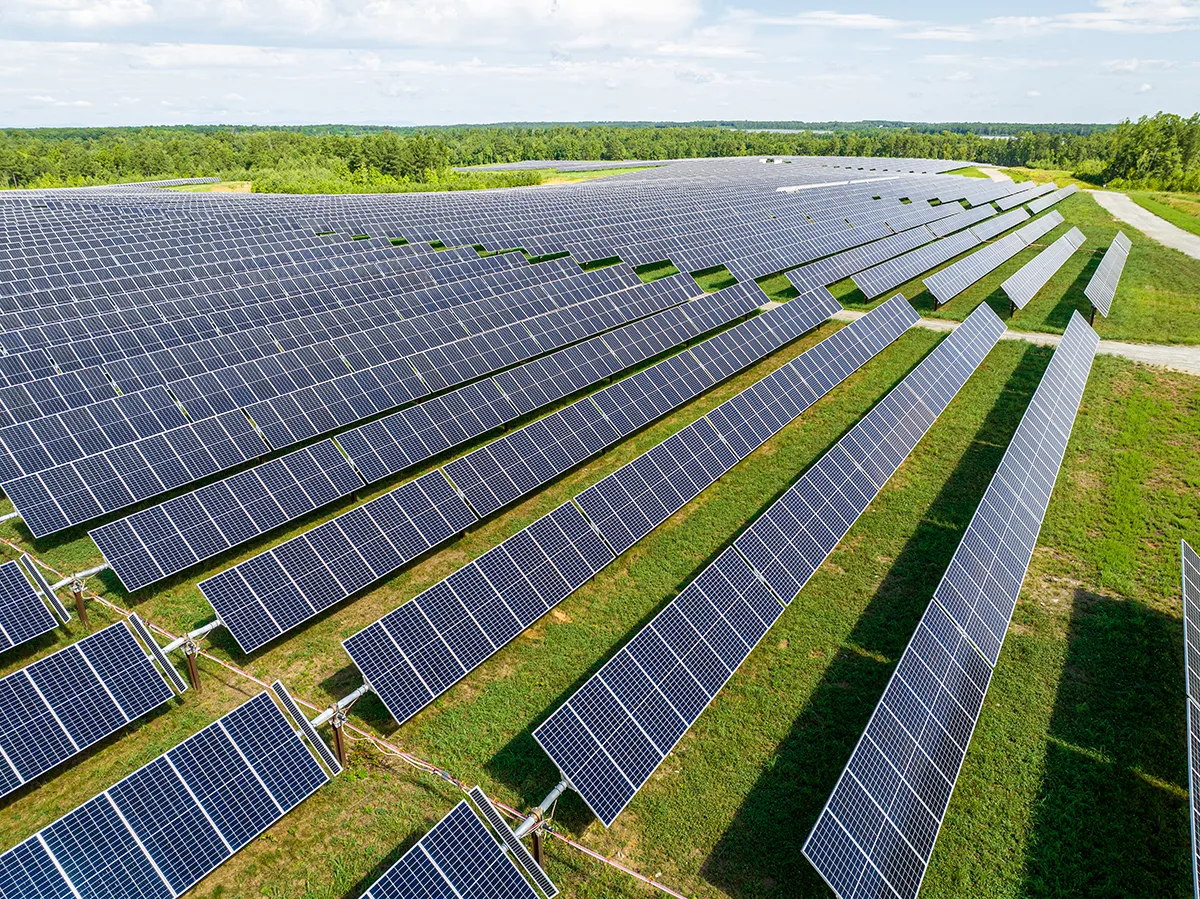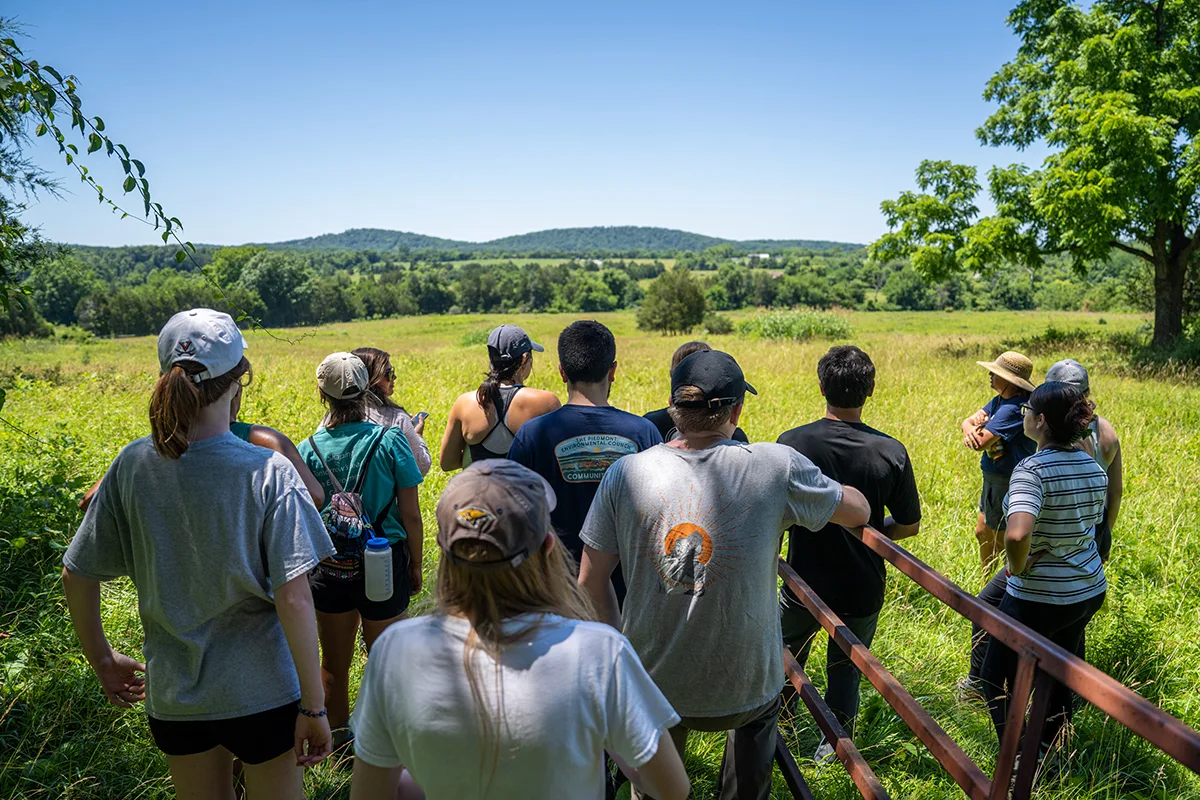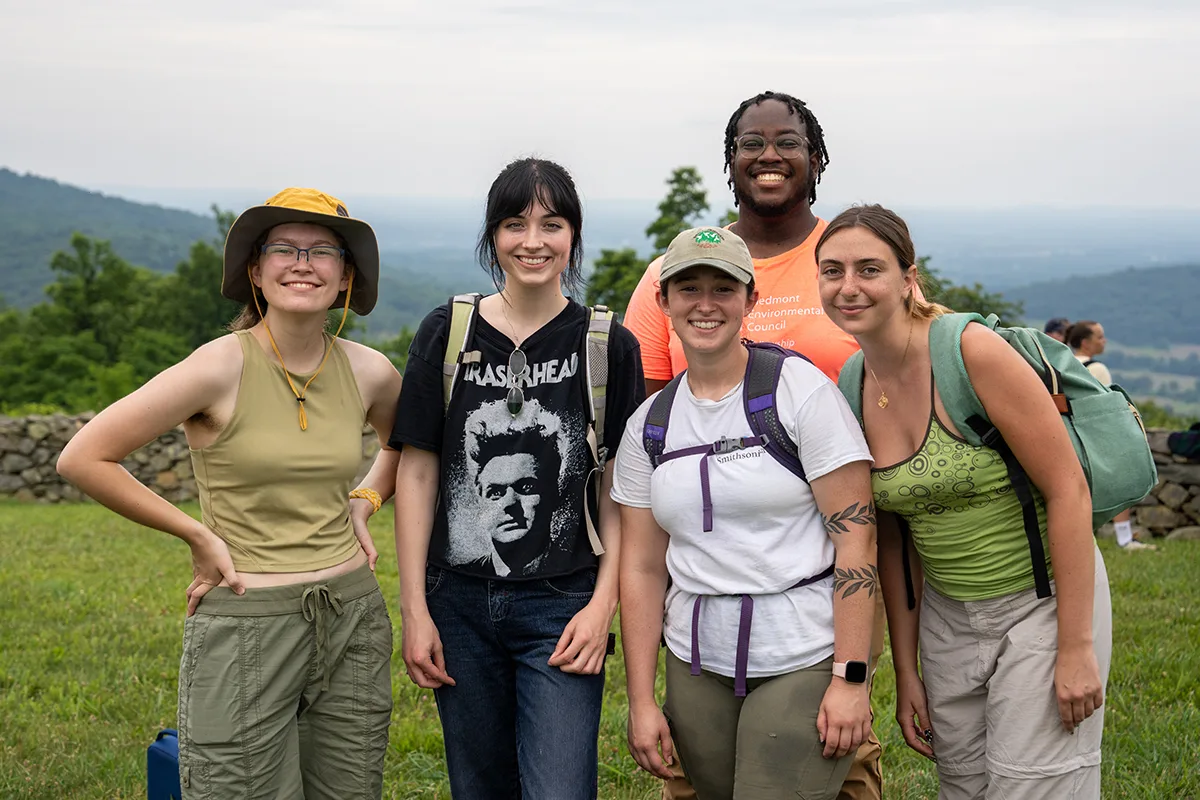The Piedmont Environmental Council works to protect and restore the lands and waters of the Virginia Piedmont, while building stronger, more sustainable communities. In each of the counties we serve, we have professional staff who care deeply about this place and tirelessly pursue land conservation, respond to development proposals and advocate for better public policies. We are there – at planning commission meetings, board of supervisors meetings, regional planning exercises, and at the state house both in person and online, to weigh in and quickly report on important outcomes. Furthermore, we work to give you the tools you need to engage in the democratic process whenever decisions are made.
The following highlights reflect our work over the past year.

Conserving and Restoring the Piedmont’s Lands and Waters
The Piedmont’s natural areas provide a foundation for thriving communities, offer sanctuary for a diverse range of plants and animals, and are an essential part of our state’s economy. As a result of PEC conservation strategies that take a robust approach to protecting critical lands, rivers, and streams, the Piedmont has become a national model for conservation, with more than 25% of lands within the region now permanently protected. And our sights are set on 30% by 2030 – a critical threshold for sustaining fish and wildlife, working farms and ranches, and natural resources like clean air and water. Currently, our land conservation staff are working with landowners and partners on over 50 projects with the potential to protect more than 17,000 acres with permanent conservation easements. Below, we share with you some additional conservation initiatives from 2023.
Accelerating Farmland Conservation
In 2023, PEC accelerated conservation of prime farmlands by leveraging funding available through the Agricultural Land Easement (ALE) program administered by the U.S. Department of Agriculture. At the present moment, our staff have secured $6.2 million in state and federal funding to advance nine ALE projects totaling 3,122 acres. Located in the upper Rappahannock watershed – an important farming hub at risk from non-agricultural development – these projects contribute significantly to our larger conservation goals. PEC is widely recognized as a leader in securing ALE funding and works to raise awareness of the program’s benefits among other organizations and landowners.
Protecting Wildlife Corridors
This year, PEC secured a $7 million grant from the federal Forest Legacy Program and engaged four landowners along the edge of Shenandoah National Park in Albemarle to develop a large, connected forestland conservation project. Complementary to this work, we’ve been coordinating with the Valley Conservation Council, the City of Waynesboro, The Conservation Fund, and other partners to explore opportunities to broaden the wildlife corridor of protected land around Shenandoah National Park on both sides of the Blue Ridge. This narrow section of the park around Afton creates a chokepoint for wildlife. Broadening the corridor would provide significant watershed protection and also help maintain the scenic viewshed from the park and along the Appalachian Trail.
Restoring Grassland Bird Habitat
Led by PEC and Smithsonian’s Virginia Working Landscapes, the Virginia Grassland Bird Initiative (VGBI) gives farmers financial incentives for delayed haying and rotational grazing, two simple practices that help protect nesting grassland birds and improve the resiliency of working farms. In 2023, 19 farmers formally enrolled 940 acres in the program, and another 10 farmers participated without incentive, contributing another 700 acres. Thanks to additional funding, VGBI now covers 16 counties in the Virginia Piedmont, Blue Ridge, and Shenandoah Valley.
Improving Water Quality
Through our Plantings for the Piedmont program, PEC provides free technical assistance, project design, materials, and labor for the planting of native trees and shrubs along streams and rivers, the single most effective means of protecting water quality throughout the Chesapeake Bay. In 2023, along with volunteers and partners, we planted more than 3,300 trees in the Potomac watershed (Clarke, Loudoun, and parts of Fauquier counties) and 6,560 trees in the Rappahannock watershed (Culpeper, Madison, Rappahannock, and parts of Orange, Greene, and Fauquier counties). In the James River watershed in Albemarle and parts of Greene counties, PEC supports and connects landowners with a similar program offered by the James River Association, the Virginia Department of Forestry and the Chesapeake Bay Foundation.
Building Bipartisan Support for Conservation
Through our partnership in the Virginia Conservation Network, PEC plays a leading role in developing statewide conservation priorities, engages actively with elected leaders from both parties, and organizes grassroots advocacy on key bills during each legislative session. In 2023, we successfully advocated for the Virginia General Assembly to increase funding for conservation in the state budget. The bipartisan wins include $5.5 million for the Culpeper Battlefields State Park through the Virginia Battlefield Preservation Fund, and $286 million in matching grants to improve best management practices on farms with the goal of reducing runoff into local waterways. This funding, allocated through the Virginia Agricultural Cost-Share and related programs, is anticipated to have positive impacts on the health of our rivers, streams, and ultimately the entire Chesapeake Bay.

Creating Stronger, More Sustainable Communities
A thoughtful approach to land use planning, paired with decision making that balances growth and development with natural and cultural resource protection is vital to maintaining a healthy and vibrant Piedmont region. PEC plans for now and the future, challenges incompatible land use projects, and works to improve livability and strengthen communities.
Through active participation in local planning commission and board of supervisor meetings, PEC works to curb poorly planned growth and development, ensuring residents’ quality of life and the protection of natural, cultural, and historic resources. More broadly, PEC leads regional planning initiatives and advocates for sound land use policies at the state level. Below are a few highlights from 2023, including our ongoing involvement in comprehensive planning and zoning ordinance rewrites.
Expanding Public Access and Connectivity
Improving accessibility to nature and connectivity between communities is a key component of PEC’s work. We are committed to this kind of work for two reasons; 1) public access to nature is shown to have immense benefits for mental health and increases our appreciation for the natural world, and 2) better connectivity to everyday amenities reduces vehicle miles traveled and greenhouse gas emissions. This year, in Rappahannock County, we supported local efforts to maintain, improve, and grow the Sperryville Trail Network. In the City of Charlottesville and Albemarle County, we mobilized funding and community advocacy to accelerate creation of a pedestrian and bicycle bridge connecting the future 1,190-acre Biscuit Run Park to surrounding neighborhoods. The Piedmont Mobility Alliance, an initiative led by PEC, continues to unite more than 40 organizations, businesses, clubs, and agencies around a shared vision of a more connected community with everyday access to the outdoors.
Data Centers and Energy Infrastructure
The data center footprint in northern Virginia has been expanding for years. However, in the last couple years there has been unprecedented growth in northern Virginia and throughout the rest of the state, outpacing anywhere else in the world. In addition to the enormous size of the buildings themselves, data centers require vast amounts of electricity and water and operate large numbers of diesel generators, and the cumulative impacts will have widespread effects on farmlands, forests, historic resources, wildlife, communities, and families. In Loudoun, Culpeper, Fauquier, and Orange counties, where multiple data center projects are proposed, PEC staff is actively working to raise community awareness and encourage local governments to fully consider their far-reaching impacts.
PEC also is leading a statewide coalition focused on four key strategic priorities: (1) strengthening regulatory oversight of data center development, (2) protecting ratepayers from excessive risks, costs, and land, air and water impacts, (3) meeting energy demands more sustainably, and (4) creating a framework to avoid and mitigate the impacts of data centers and their energy infrastructure.
On the Ground
In each of the nine counties we serve, PEC staff are addressing land use issues that can have huge impacts on local residents and the environment.
Albemarle County
Albemarle is in the process of updating its Comprehensive Plan, which will have important implications on growth, development, traffic, natural resources, housing, and more over the next 20 years. One of our concerns has been the de-emphasis of thoughtful planning in the rural areas of the county – important to the county’s drinking water supply, wildlife habitat, working farms which provide food security, and landscape resiliency against a changing climate. We continue working to engage both the community and the Board of Supervisors on a plan that recognizes the value of rural areas in advancing the County’s climate, equity, and other goals.
Clarke County
In Clarke, our field representatives participated in public hearings and work sessions to ensure that the conservation of vital rural lands and waterways were taken into consideration as the county rewrote the zoning ordinance in 2023. We also tracked and contributed to the public dialogue around the Carter Hall special use permit application that came before the Planning Commission. At the current moment, we are monitoring a proposal for a 50-megawatt utility- scale solar project that could permanently impact hundreds of acres of prime farm soils.
Culpeper County
In Culpeper, PEC and the Stevensburg community were able to get the “Commerce and Innovation” designation removed from the future land use map. This designation was meant to encourage data center development, and its removal led to the withdrawal of a data center application for historic Brandy Station. PEC’s efforts also led to the removal of the “Rural Transition Area” sited for Brandy Station, a designation that would have led to future growth in the area. This was an important acknowledgment by the Board of Supervisiors of this historic community and the change supports the new state park at Culpeper Battlefields.
Fauquier County
Despite the contentious approval of Amazon’s special use permit in February, PEC continues to put pressure on the Town of Warrenton to correct numerous problems with Amazon’s site plan. Since the approval of the Amazon data center, there has been a slew of new data center proposals around Fauquier. Our staff are diligently acting to raise awareness of these proposals and put pressure on the Board of Supervisors to fully consider the possible impacts and be more deliberate with consideration of the Maple Tree, Convergent, and Catlett data center sites.
Greene County
Like many of the counties in our region, Greene is working through an update on their comprehensive plan. PEC worked with Preserve Rural Greene to recommend that the county create a task force or work group to advise them on planning for the rural areas. Our staff also advised Protect Rural Greene and submitted a comment letter to the county on a proposal to add cluster subdivisions in the rural areas in the comprehensive plan. Cluster subdivisions, a method of suburban development that aims to preserve greenspace, are not endorsed by PEC in agricultural and conservation zoning districts.
Loudoun County
Our staff in Loudoun were busy throughout 2023 balancing a host of complicated issues ranging from a zoning ordinance rewrite and data center impacts, to the expansion proposal for Mickie Gordon Park in the rural area near Middleburg. Earlier in the year, when faced with a proposed Department of Environmental Quality variance to lift the cap on data center emergency generator use from March 15 through July 31, PEC sprang into action to alert the public. The resulting outcry quickly led to the defeat of this variance due to the potentially disastrous effects it would have on resident’s air quality. Our work on the zoning ordinance rewrite continues as we strongly advocate for the preservation of prime agricultural soils – a vital natural resource being rapidly lost to aggressive suburban development.
Madison County
A committee of residents and representatives from the Planning Commission and Board of Supervisors continues to work on the comprehensive plan review. PEC has been playing an active role in this process and advocates for meaningful public input opportunities. Additionally, we continue to monitor ill-sited development proposals that are incompatible with the county’s rural character such as utility-scale solar and event centers.
Orange County
After two years of PEC and other groups repeatedly raising concerns and near unanimous citizen objection at the public hearing, the Board of Supervisors approved the ill-conceived Wilderness Crossing proposal. This development represents the largest rezoning in Orange County’s history and could include 5,000 residential units as well as over 5 million square feet of data center and/or distribution center space. In response to the rezoning approval, American Battlefield Trust and other groups have filed suit against the county for violations of state law and local ordinance. Although not a plaintiff in the lawsuit, PEC is playing an active role by offering our land use expertise and advanced knowledge of the site’s potential hazards.
Rappahannock County
In 2023, PEC staff engaged with local representatives, partner organizations, and community members on a few key topics. Beyond our work on the Sperryville Trail Network, we’ve monitored the contentious boundary adjustment plan for the Town of Washington and advocated for improved walkability. We recognize the community support for pedestrian safety and town connectivity in the county and are working to find funding opportunities.

Shaping and Advancing Virginia’s Clean Energy Future
Securing the future of our planet requires a rapid transition to clean energy. Virginia has taken a significant step toward this goal by establishing ambitious targets for boosting renewable energy production. However, the energy demand from data centers is compromising our clean energy goals. In the next 15 years, electricity demand is projected to more than double with nearly the entire increase due to this new form of industrial development. As a result, the Virginia Piedmont region is seeing new energy and transmission facilities proposed for our region at an unprecedented rate.
Utility-scale Solar Siting
Enacted in 2022, House Bill 206 authorized the establishment of regulations for large scale solar projects that disturb more than 10 acres of prime agricultural soils or more than 50 acres of contiguous forests. This year, PEC collaborated with community members, Virginia Conservation Network partners, solar developers, and other stakeholders to develop these mitigation standards as part of a Virginia Department of Environmental Quality regulatory advisory panel. By working together, we are creating a more transparent and predictable regulatory framework to scale up solar while protecting our forests and most valuable soils.
Supporting Distributed Solar
We recognize that there is an urgent need for education around how our energy systems function and the resources available for rooftop and ground mount solar in Virginia. In 2023, PEC brought on a new Senior Energy and Climate Policy Analyst to expand in-house expertise on matters related to energy production and distribution. As part of this work, PEC co-authored three briefing papers adopted by the Virginia Conservation Network into their policy platform: “Expanding Access to Community Solar,” “Powering Progress Through Rooftop Solar,” and “Deploying Utility-Scale Solar Responsibly.”

Setting an Example Through Land Ownership
PEC has taken on the occasional role of landowner across the Piedmont region. Our ownership of properties often serves short-term purposes, such as when we receive land donations and subsequently place conservation protections on the land before eventually selling it. Alternatively, we may acquire land and then transfer ownership to a local government or government agency to help complete missing trail connections or expand park boundaries.
In some instances, PEC becomes a long-term landowner, exemplified by properties like Roundabout Meadows in Aldie and the Piedmont Memorial Overlook in Paris. These holdings serve as cornerstones for conservation efforts along the Route 50 corridor and the Blue Ridge Mountains, two critical gateways to the Piedmont region. In every case, PEC places a premium on preserving or enhancing the natural, cultural, or historical significance of these properties.
PEC Properties at Gilberts Corners
PEC’s Community Farm is a place where individuals of all ages can gather to learn and give back to those in need. Volunteers donated more than 1,000 hours to help us grow and harvest over 36,000 pounds of produce to support food insecure populations in Loudoun and Clarke counties. In total, our volunteer programs, educational programs, and field walks brought over 900 community members – including roughly 200 students – to Gilberts Corner, from the Community Farm at Roundabout Meadows to pastures, meadows, and the Old Carolina Road Trail.
Piedmont Memorial Overlook
Twenty-three years after being purchased by PEC with assistance from local families and foundations, the Piedmont Memorial Overlook is a showcase for conservation, habitat restoration, and public access to nature. This past year, our Piedmont Memorial Overlook Advisory Committee approved an updated five-year plan for managing the 50-acre property, focusing on five key elements: memorializing conservation leadership, native biodiversity, education and public outreach, public access, and preservation of cultural resources. On-the-ground work continues and includes prescribed burns, removal of invasives, and the installation of educational signage.
Mentoring the Next Generation of Conservation Stewards
PEC’s annual eight-week Summer Fellowship Program engaged 12 college students and graduates in classroom discussions, field trips, and hands-on activities designed to impart practical knowledge and skills. This past year, our fellows enjoyed three weeks here with us and five weeks of virtual learning from their homes in Virginia, Maryland, New York, and Illinois. Additionally, PEC’s Community Farm welcomed its first cohort of summer interns. Madeline, Bella, and Lucy were a fantastic addition to the farm team and were able to fully engage in all aspects of farm production and volunteer engagement. We hope to be able to continue and improve upon the internship in 2024 and beyond.

